Analysis of Internet Control, Online Politics, and Democracy in China
VerifiedAdded on 2023/04/07
|5
|1185
|173
Essay
AI Summary
This essay examines the intricate relationship between internet control, online politics, and democracy in China. It begins by outlining China's strict regulation of the internet, including censorship, restrictions on social media, and the government's influence on online content and traffic. The essay then delves into how these controls impact online political discourse, citizen participation, and the fragmentation of online audiences. The essay contrasts China's approach with the more open internet environments of Western countries, highlighting differences in internet usage, gender disparities, and the emphasis on community versus individual rights. It also explores the role of online politics in democracies, referencing examples like Canada and Hong Kong, and analyzes how online media shapes political discussions and the dissemination of information. The essay concludes by emphasizing the limitations of online politics in China due to censorship and the importance of a free and open internet for democratic processes.
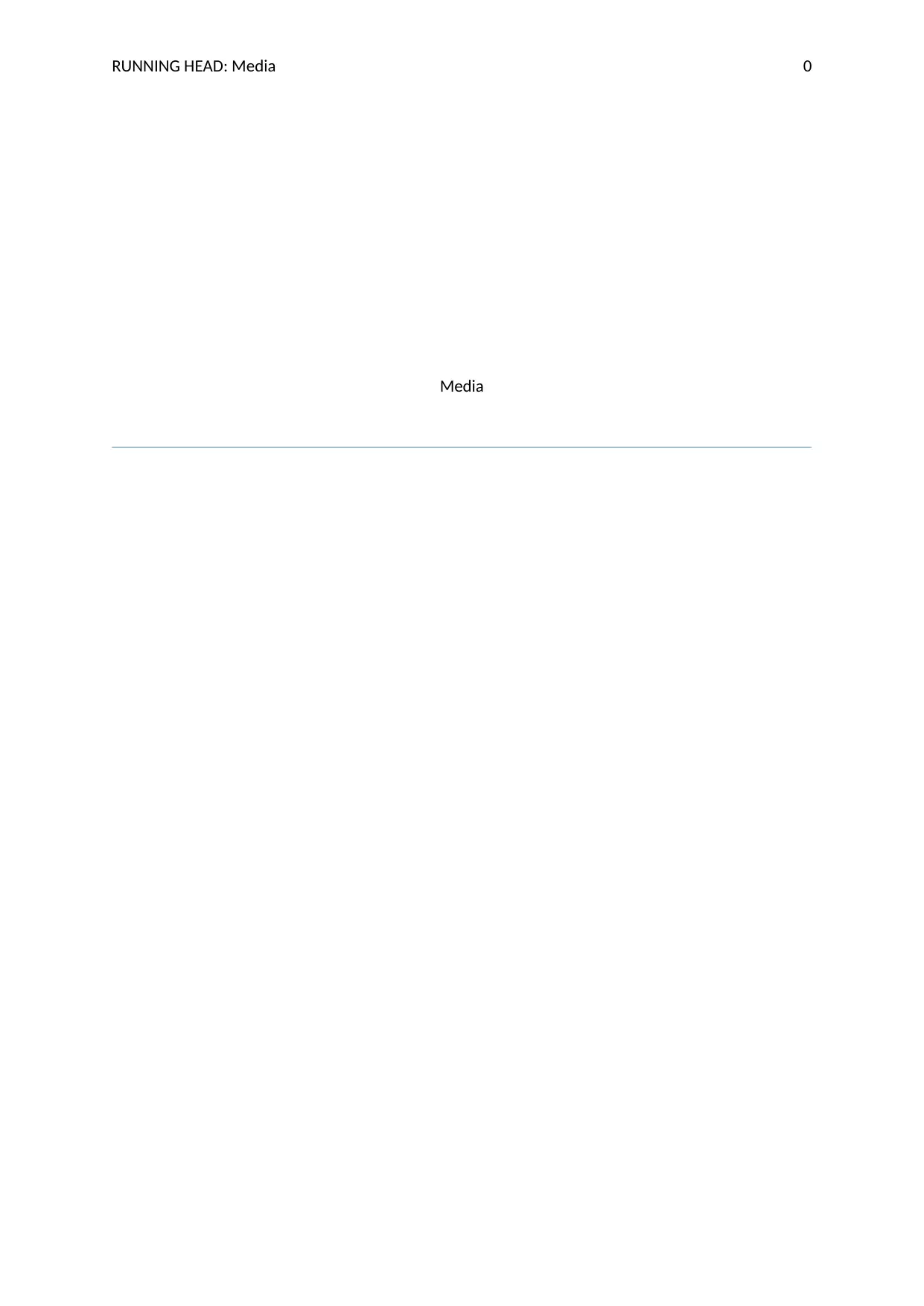
RUNNING HEAD: Media 0
Media
Media
Paraphrase This Document
Need a fresh take? Get an instant paraphrase of this document with our AI Paraphraser
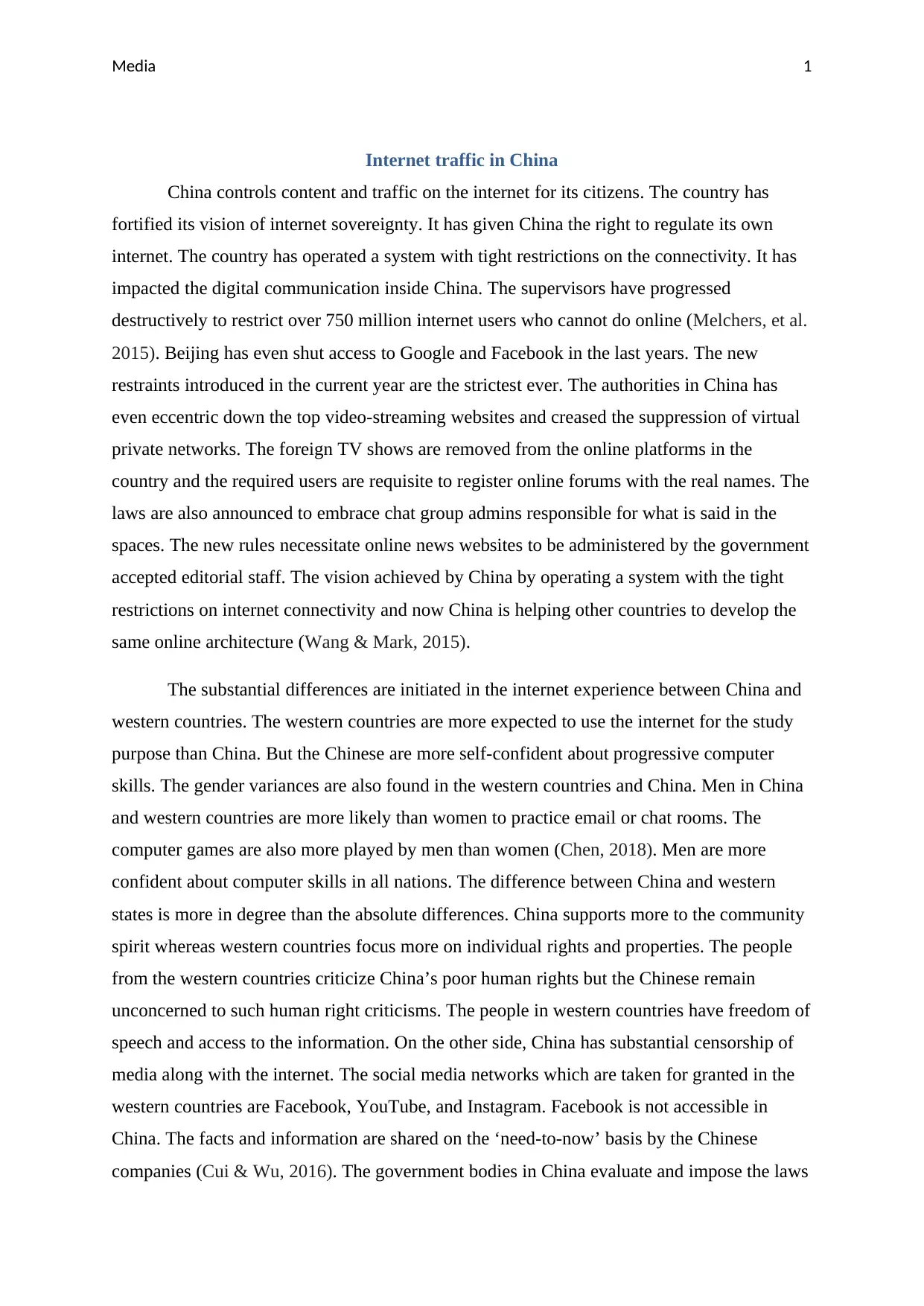
Media 1
Internet traffic in China
China controls content and traffic on the internet for its citizens. The country has
fortified its vision of internet sovereignty. It has given China the right to regulate its own
internet. The country has operated a system with tight restrictions on the connectivity. It has
impacted the digital communication inside China. The supervisors have progressed
destructively to restrict over 750 million internet users who cannot do online (Melchers, et al.
2015). Beijing has even shut access to Google and Facebook in the last years. The new
restraints introduced in the current year are the strictest ever. The authorities in China has
even eccentric down the top video-streaming websites and creased the suppression of virtual
private networks. The foreign TV shows are removed from the online platforms in the
country and the required users are requisite to register online forums with the real names. The
laws are also announced to embrace chat group admins responsible for what is said in the
spaces. The new rules necessitate online news websites to be administered by the government
accepted editorial staff. The vision achieved by China by operating a system with the tight
restrictions on internet connectivity and now China is helping other countries to develop the
same online architecture (Wang & Mark, 2015).
The substantial differences are initiated in the internet experience between China and
western countries. The western countries are more expected to use the internet for the study
purpose than China. But the Chinese are more self-confident about progressive computer
skills. The gender variances are also found in the western countries and China. Men in China
and western countries are more likely than women to practice email or chat rooms. The
computer games are also more played by men than women (Chen, 2018). Men are more
confident about computer skills in all nations. The difference between China and western
states is more in degree than the absolute differences. China supports more to the community
spirit whereas western countries focus more on individual rights and properties. The people
from the western countries criticize China’s poor human rights but the Chinese remain
unconcerned to such human right criticisms. The people in western countries have freedom of
speech and access to the information. On the other side, China has substantial censorship of
media along with the internet. The social media networks which are taken for granted in the
western countries are Facebook, YouTube, and Instagram. Facebook is not accessible in
China. The facts and information are shared on the ‘need-to-now’ basis by the Chinese
companies (Cui & Wu, 2016). The government bodies in China evaluate and impose the laws
Internet traffic in China
China controls content and traffic on the internet for its citizens. The country has
fortified its vision of internet sovereignty. It has given China the right to regulate its own
internet. The country has operated a system with tight restrictions on the connectivity. It has
impacted the digital communication inside China. The supervisors have progressed
destructively to restrict over 750 million internet users who cannot do online (Melchers, et al.
2015). Beijing has even shut access to Google and Facebook in the last years. The new
restraints introduced in the current year are the strictest ever. The authorities in China has
even eccentric down the top video-streaming websites and creased the suppression of virtual
private networks. The foreign TV shows are removed from the online platforms in the
country and the required users are requisite to register online forums with the real names. The
laws are also announced to embrace chat group admins responsible for what is said in the
spaces. The new rules necessitate online news websites to be administered by the government
accepted editorial staff. The vision achieved by China by operating a system with the tight
restrictions on internet connectivity and now China is helping other countries to develop the
same online architecture (Wang & Mark, 2015).
The substantial differences are initiated in the internet experience between China and
western countries. The western countries are more expected to use the internet for the study
purpose than China. But the Chinese are more self-confident about progressive computer
skills. The gender variances are also found in the western countries and China. Men in China
and western countries are more likely than women to practice email or chat rooms. The
computer games are also more played by men than women (Chen, 2018). Men are more
confident about computer skills in all nations. The difference between China and western
states is more in degree than the absolute differences. China supports more to the community
spirit whereas western countries focus more on individual rights and properties. The people
from the western countries criticize China’s poor human rights but the Chinese remain
unconcerned to such human right criticisms. The people in western countries have freedom of
speech and access to the information. On the other side, China has substantial censorship of
media along with the internet. The social media networks which are taken for granted in the
western countries are Facebook, YouTube, and Instagram. Facebook is not accessible in
China. The facts and information are shared on the ‘need-to-now’ basis by the Chinese
companies (Cui & Wu, 2016). The government bodies in China evaluate and impose the laws
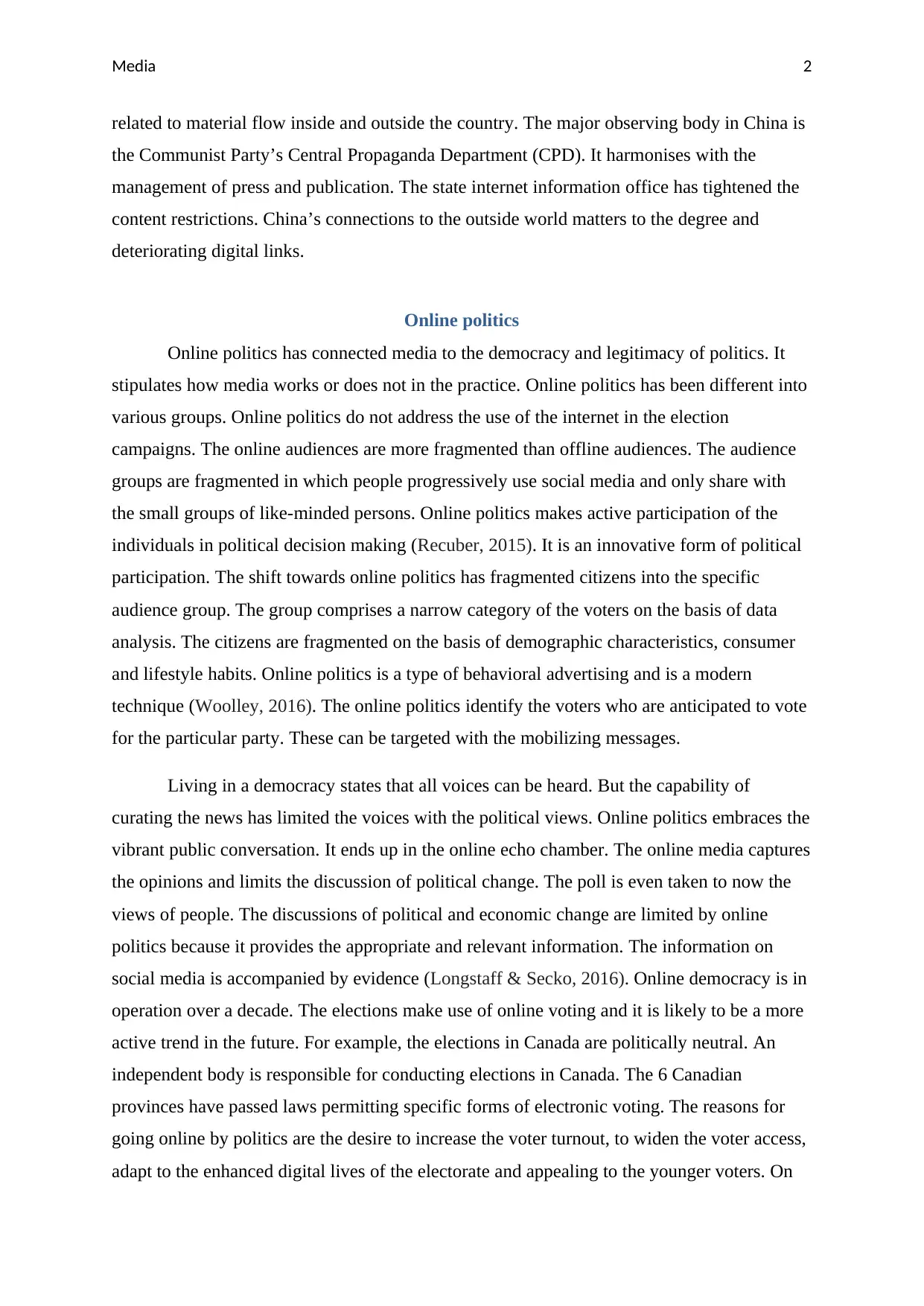
Media 2
related to material flow inside and outside the country. The major observing body in China is
the Communist Party’s Central Propaganda Department (CPD). It harmonises with the
management of press and publication. The state internet information office has tightened the
content restrictions. China’s connections to the outside world matters to the degree and
deteriorating digital links.
Online politics
Online politics has connected media to the democracy and legitimacy of politics. It
stipulates how media works or does not in the practice. Online politics has been different into
various groups. Online politics do not address the use of the internet in the election
campaigns. The online audiences are more fragmented than offline audiences. The audience
groups are fragmented in which people progressively use social media and only share with
the small groups of like-minded persons. Online politics makes active participation of the
individuals in political decision making (Recuber, 2015). It is an innovative form of political
participation. The shift towards online politics has fragmented citizens into the specific
audience group. The group comprises a narrow category of the voters on the basis of data
analysis. The citizens are fragmented on the basis of demographic characteristics, consumer
and lifestyle habits. Online politics is a type of behavioral advertising and is a modern
technique (Woolley, 2016). The online politics identify the voters who are anticipated to vote
for the particular party. These can be targeted with the mobilizing messages.
Living in a democracy states that all voices can be heard. But the capability of
curating the news has limited the voices with the political views. Online politics embraces the
vibrant public conversation. It ends up in the online echo chamber. The online media captures
the opinions and limits the discussion of political change. The poll is even taken to now the
views of people. The discussions of political and economic change are limited by online
politics because it provides the appropriate and relevant information. The information on
social media is accompanied by evidence (Longstaff & Secko, 2016). Online democracy is in
operation over a decade. The elections make use of online voting and it is likely to be a more
active trend in the future. For example, the elections in Canada are politically neutral. An
independent body is responsible for conducting elections in Canada. The 6 Canadian
provinces have passed laws permitting specific forms of electronic voting. The reasons for
going online by politics are the desire to increase the voter turnout, to widen the voter access,
adapt to the enhanced digital lives of the electorate and appealing to the younger voters. On
related to material flow inside and outside the country. The major observing body in China is
the Communist Party’s Central Propaganda Department (CPD). It harmonises with the
management of press and publication. The state internet information office has tightened the
content restrictions. China’s connections to the outside world matters to the degree and
deteriorating digital links.
Online politics
Online politics has connected media to the democracy and legitimacy of politics. It
stipulates how media works or does not in the practice. Online politics has been different into
various groups. Online politics do not address the use of the internet in the election
campaigns. The online audiences are more fragmented than offline audiences. The audience
groups are fragmented in which people progressively use social media and only share with
the small groups of like-minded persons. Online politics makes active participation of the
individuals in political decision making (Recuber, 2015). It is an innovative form of political
participation. The shift towards online politics has fragmented citizens into the specific
audience group. The group comprises a narrow category of the voters on the basis of data
analysis. The citizens are fragmented on the basis of demographic characteristics, consumer
and lifestyle habits. Online politics is a type of behavioral advertising and is a modern
technique (Woolley, 2016). The online politics identify the voters who are anticipated to vote
for the particular party. These can be targeted with the mobilizing messages.
Living in a democracy states that all voices can be heard. But the capability of
curating the news has limited the voices with the political views. Online politics embraces the
vibrant public conversation. It ends up in the online echo chamber. The online media captures
the opinions and limits the discussion of political change. The poll is even taken to now the
views of people. The discussions of political and economic change are limited by online
politics because it provides the appropriate and relevant information. The information on
social media is accompanied by evidence (Longstaff & Secko, 2016). Online democracy is in
operation over a decade. The elections make use of online voting and it is likely to be a more
active trend in the future. For example, the elections in Canada are politically neutral. An
independent body is responsible for conducting elections in Canada. The 6 Canadian
provinces have passed laws permitting specific forms of electronic voting. The reasons for
going online by politics are the desire to increase the voter turnout, to widen the voter access,
adapt to the enhanced digital lives of the electorate and appealing to the younger voters. On
⊘ This is a preview!⊘
Do you want full access?
Subscribe today to unlock all pages.

Trusted by 1+ million students worldwide
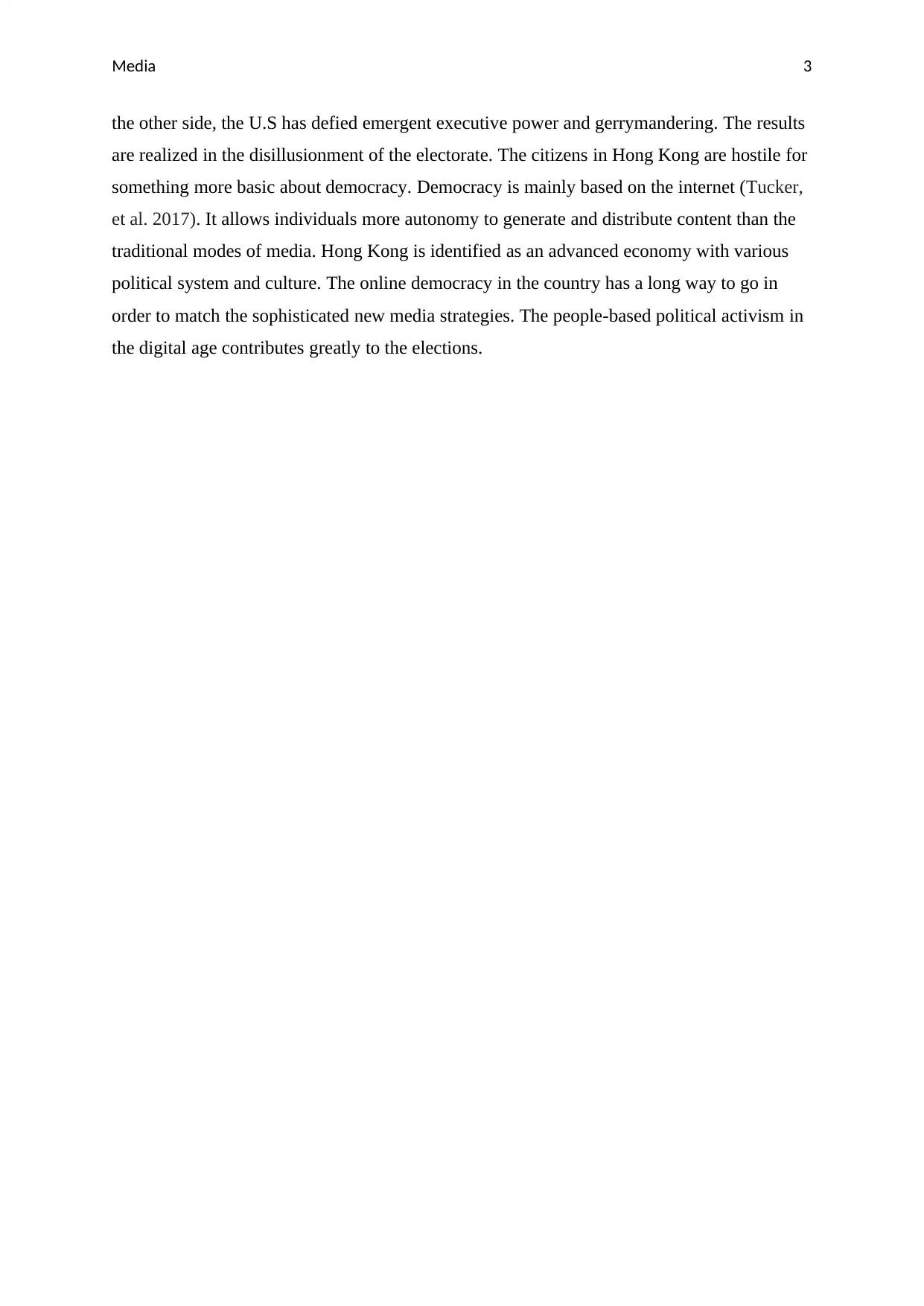
Media 3
the other side, the U.S has defied emergent executive power and gerrymandering. The results
are realized in the disillusionment of the electorate. The citizens in Hong Kong are hostile for
something more basic about democracy. Democracy is mainly based on the internet (Tucker,
et al. 2017). It allows individuals more autonomy to generate and distribute content than the
traditional modes of media. Hong Kong is identified as an advanced economy with various
political system and culture. The online democracy in the country has a long way to go in
order to match the sophisticated new media strategies. The people-based political activism in
the digital age contributes greatly to the elections.
the other side, the U.S has defied emergent executive power and gerrymandering. The results
are realized in the disillusionment of the electorate. The citizens in Hong Kong are hostile for
something more basic about democracy. Democracy is mainly based on the internet (Tucker,
et al. 2017). It allows individuals more autonomy to generate and distribute content than the
traditional modes of media. Hong Kong is identified as an advanced economy with various
political system and culture. The online democracy in the country has a long way to go in
order to match the sophisticated new media strategies. The people-based political activism in
the digital age contributes greatly to the elections.
Paraphrase This Document
Need a fresh take? Get an instant paraphrase of this document with our AI Paraphraser
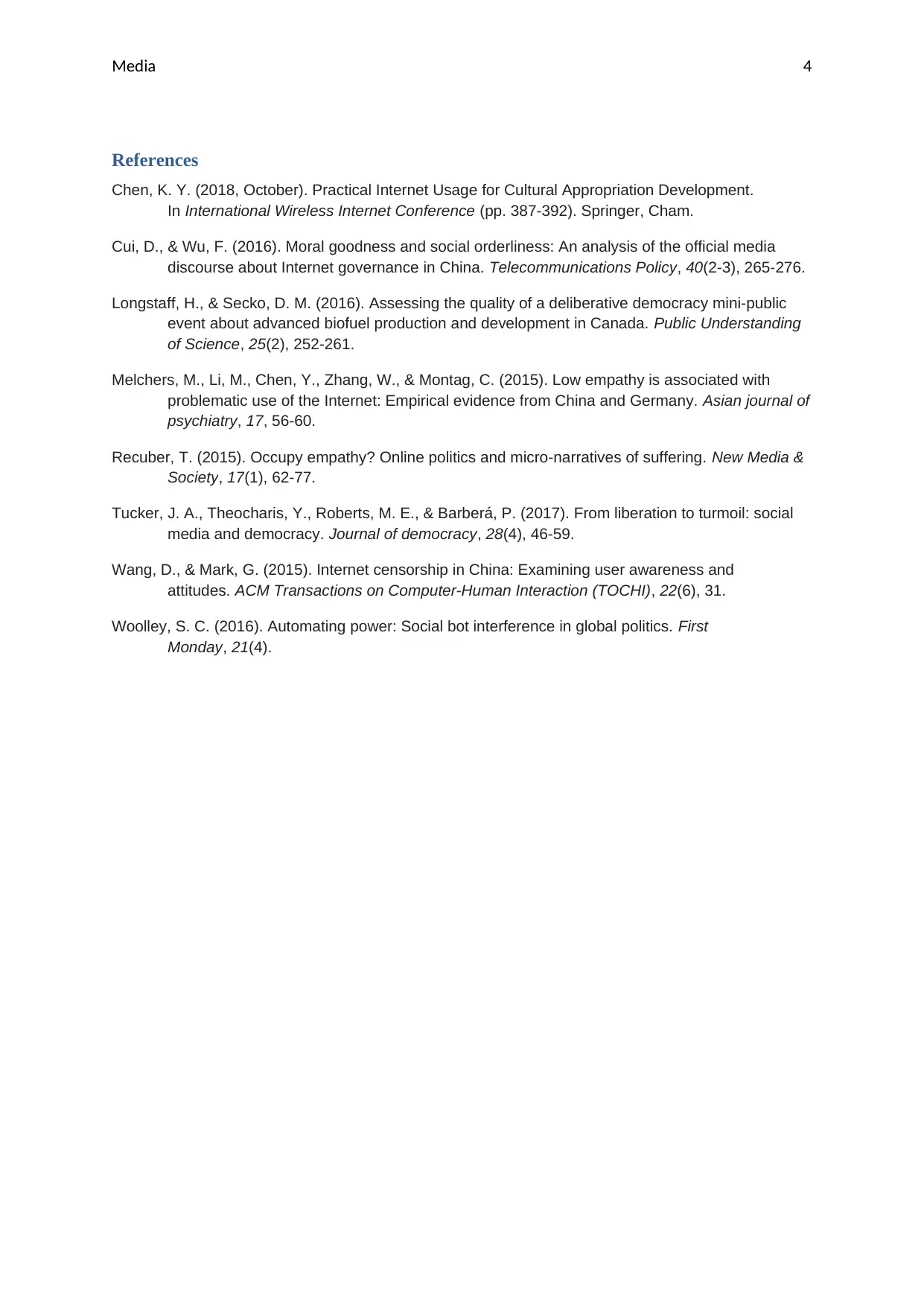
Media 4
References
Chen, K. Y. (2018, October). Practical Internet Usage for Cultural Appropriation Development.
In International Wireless Internet Conference (pp. 387-392). Springer, Cham.
Cui, D., & Wu, F. (2016). Moral goodness and social orderliness: An analysis of the official media
discourse about Internet governance in China. Telecommunications Policy, 40(2-3), 265-276.
Longstaff, H., & Secko, D. M. (2016). Assessing the quality of a deliberative democracy mini-public
event about advanced biofuel production and development in Canada. Public Understanding
of Science, 25(2), 252-261.
Melchers, M., Li, M., Chen, Y., Zhang, W., & Montag, C. (2015). Low empathy is associated with
problematic use of the Internet: Empirical evidence from China and Germany. Asian journal of
psychiatry, 17, 56-60.
Recuber, T. (2015). Occupy empathy? Online politics and micro-narratives of suffering. New Media &
Society, 17(1), 62-77.
Tucker, J. A., Theocharis, Y., Roberts, M. E., & Barberá, P. (2017). From liberation to turmoil: social
media and democracy. Journal of democracy, 28(4), 46-59.
Wang, D., & Mark, G. (2015). Internet censorship in China: Examining user awareness and
attitudes. ACM Transactions on Computer-Human Interaction (TOCHI), 22(6), 31.
Woolley, S. C. (2016). Automating power: Social bot interference in global politics. First
Monday, 21(4).
References
Chen, K. Y. (2018, October). Practical Internet Usage for Cultural Appropriation Development.
In International Wireless Internet Conference (pp. 387-392). Springer, Cham.
Cui, D., & Wu, F. (2016). Moral goodness and social orderliness: An analysis of the official media
discourse about Internet governance in China. Telecommunications Policy, 40(2-3), 265-276.
Longstaff, H., & Secko, D. M. (2016). Assessing the quality of a deliberative democracy mini-public
event about advanced biofuel production and development in Canada. Public Understanding
of Science, 25(2), 252-261.
Melchers, M., Li, M., Chen, Y., Zhang, W., & Montag, C. (2015). Low empathy is associated with
problematic use of the Internet: Empirical evidence from China and Germany. Asian journal of
psychiatry, 17, 56-60.
Recuber, T. (2015). Occupy empathy? Online politics and micro-narratives of suffering. New Media &
Society, 17(1), 62-77.
Tucker, J. A., Theocharis, Y., Roberts, M. E., & Barberá, P. (2017). From liberation to turmoil: social
media and democracy. Journal of democracy, 28(4), 46-59.
Wang, D., & Mark, G. (2015). Internet censorship in China: Examining user awareness and
attitudes. ACM Transactions on Computer-Human Interaction (TOCHI), 22(6), 31.
Woolley, S. C. (2016). Automating power: Social bot interference in global politics. First
Monday, 21(4).
1 out of 5
Related Documents
Your All-in-One AI-Powered Toolkit for Academic Success.
+13062052269
info@desklib.com
Available 24*7 on WhatsApp / Email
![[object Object]](/_next/static/media/star-bottom.7253800d.svg)
Unlock your academic potential
Copyright © 2020–2026 A2Z Services. All Rights Reserved. Developed and managed by ZUCOL.



